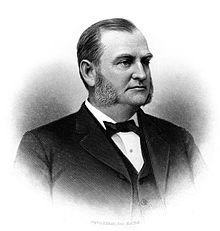Oliver Ames (governor)
| Oliver Ames | |
|---|---|
 |
|
| 35th Governor of Massachusetts | |
|
In office January 6, 1887 – January 7, 1890 |
|
| Lieutenant | John Q. A. Brackett |
| Preceded by | George D. Robinson |
| Succeeded by | John Q. A. Brackett |
| 33rd Lieutenant Governor of Massachusetts | |
|
In office January 4, 1883 – January 6, 1887 |
|
| Governor |
Benjamin F. Butler George D. Robinson |
| Preceded by | Byron Weston |
| Succeeded by | John Q. A. Brackett |
| Massachusetts Senate | |
|
In office 1881–1882 |
|
| Town of Easton School Committee |
|
| Personal details | |
| Born |
February 4, 1831 Easton, Massachusetts |
| Died | October 22, 1895 (aged 64) Easton, Massachusetts |
| Political party | Republican |
| Spouse(s) | Anna Coffin Ray |
| Children | Oakes Ames |
| Profession | Financier |
| Signature | |
Oliver Ames (February 4, 1831 – October 22, 1895) was an American businessman, financier and politician from Massachusetts. He was the son of Oakes Ames (1804–1873), a railroad baron behind the construction of the Union Pacific Railroad (UP) who was notably censured in the Credit Mobilier scandal for actions taken while a United States Congressman. Ames was executor of his father's estate, and took over many of his business interests. A Republican, he served as the 35th Governor of Massachusetts (1887–1890). He was a major philanthropist, especially in his hometown of Easton, which is graced by a number of architecturally significant works by H.H. Richardson as a result of his influence.
Oliver Ames was born in North Easton, Massachusetts on February 4, 1831, to Oakes Ames and Eveline Orville (Gilmore) Ames. His father was the owner of a shovel factory, which became the largest such business in the country. Ames was educated in the local schools, and then attended private academies in North Attleborough and Leicester. He was briefly employed in the family's factory before enrolling in Brown University in 1851. He spent three years there, in a custom-designed program overseen by university president Francis Wayland.
Ames then entered the family business, where he learned all aspects of its manufacturing processes and worked as a traveling salesman. When his grandfather Oliver died in 1863, he became a partner in the business. During the American Civil War, he oversaw the manufacturing department, introducing efficiencies in the manufacturing processes and expanding the business. During these years his grandfather, uncle, and father, in addition to expanding the shovel business, invested in railroads and other industrial concerns.
...
Wikipedia
